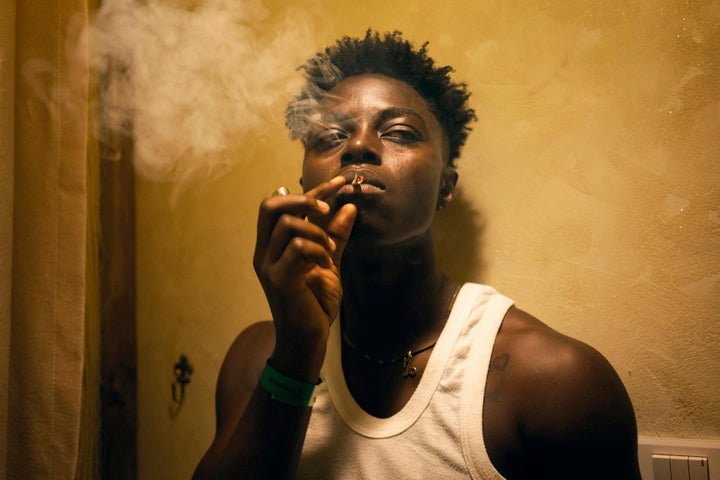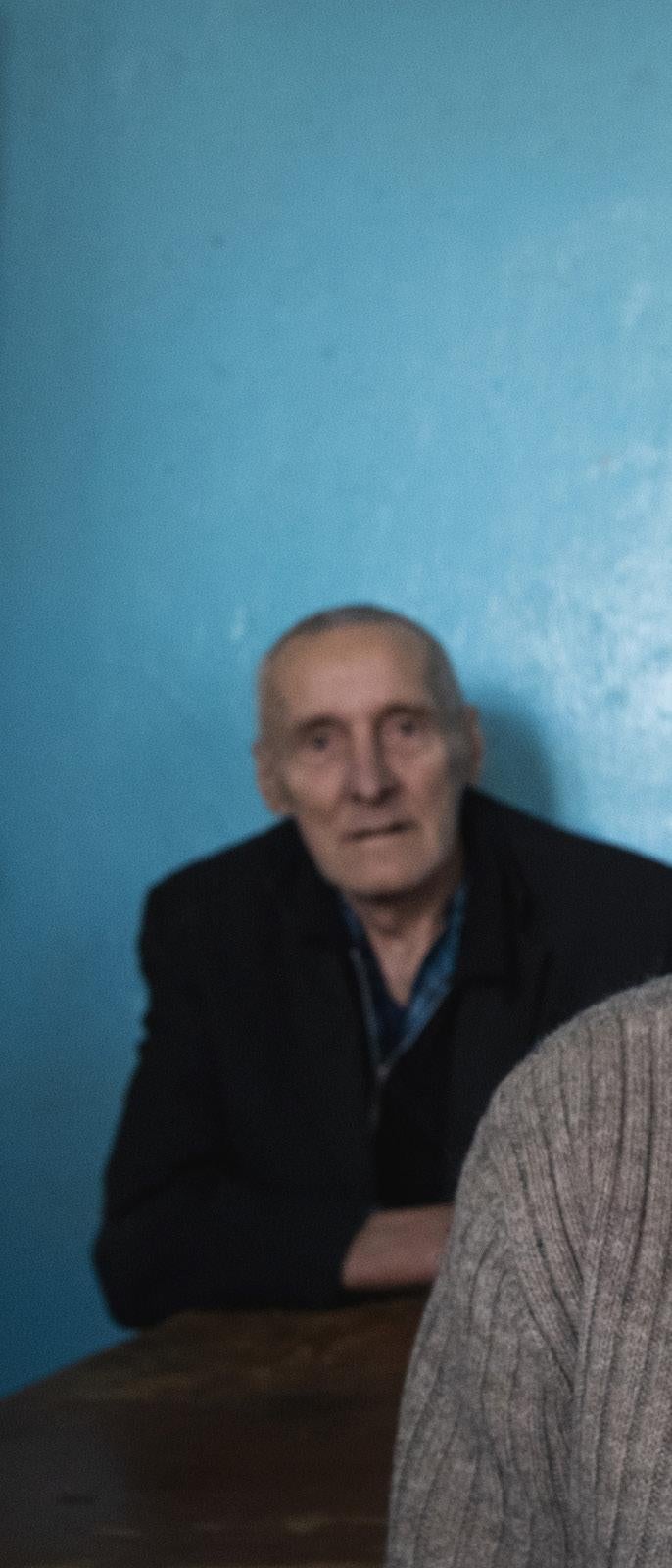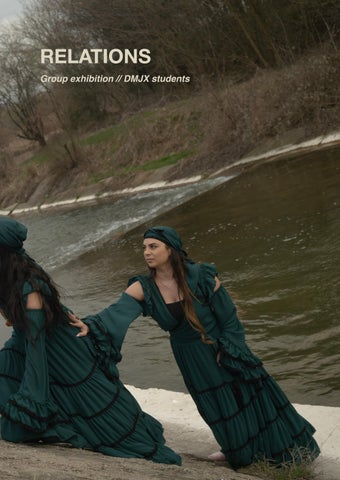
6 minute read
LIV LATRICIA HABEL
For the past two years the Ghanaian parliament has been processing an anti LGBTQ bill, intending to fight homosexuality. The implementation of the bill would outlaw any sympathy for the LGBTQ community. Individuals could spend up to five years in jail for showing affection in public. Gay Rights advocates could face up to ten years of imprisonment. Stigmatization and discrimination are growing both politically and socially. The number of arrests and violent attacks on members of the LGBTQ community and organizations working for the cause has increased, forcing community members to take personal safety measures when moving in public spaces. Only a handful of the community members can imagine their future unfolding in their home country.
At the same time, daily life proceeds. The queer community continues to fall in love, get engaged, organize parties, find solace and resistance amongst chosen families, and form collectives fighting for their right to stand their ground and determine their futures.
“Thats just the way she is.”
Dorothy has always been interested in sports and is good at it, too. It was a gift from God. No matter if its Rugby, Soccer or Basketball, when Dorothy plays on the field, he feels free and weightless. No one can judge him here and all worries disappear.
Working out is woven into Dorothy’s identity. So is the masculine appearance. Dorothy’s father doesn’t mind him dressing in a masculine way. He defends Dorothy every time people comment on his appearance: “That’s just the way she is.”
Dorothy says nobody would guess his sexuality without knowing, still he has heard of Oba Baarima. Back in the days when somebody was called Oba Baarima, it was an expression for a physically strong female, like Dorothy. Now the Twi expression has a negative connotation and is used by people as a slur.
“Every gay girl or boy in Ghana would like to travel outside of this country to be free. Just to have the experience of walking outside freely, dress like a girl or dress like a boy, without anyone questioning them. Without anyone attacking them. I love my country, but this is too much.” - Dorothy, 23.

Hair Liberation
Since last year, Roland has had her own salon. Her work liberates her, it helps her to heal and gives her a sense of belonging.

“I don’t know what I would do without hair. This makes me happy. This gives me joy. Seeing people beautiful all the time. You get it,” says Roland.
Doing hair brought her closer to selfacceptance, too. Aged 19, after her parents refused to accept her sexuality, Roland left her family home in Abuja, Nigeria. At that time, she was experienced enough to provide for herself by doing hair and so she moved to Lagos. Managing her skills as a hairdresser gave Roland a ticket to independence. In 2018, she was offered a hair gig in Accra, where she has been since. Though Roland is happy in her salon, the safety she feels within it doesn’t expand beyond its four walls. In five to ten years’ time, Roland sees herself owning a salon in the US, Canada or Germany. A place where she wouldn’t need to lock the doors because of her sexuality.
“I love everything about queerness. The colors. The love. The community and the confidence we have. But not in Africa. We don’t live to the fullest until we leave to a place, where we are being accepted.”- Roland, 28.
Being a queer mom
In 2018, 18 years old and while living under her mother’s roof, Destiny gave birth to her son Abdi Malik. Shortly after, Destiny met a new friend, which grew into a romantic relationship. The friend took her to a gay party, the likes of which Destiny had never been to before, and which promptly got raided by the police. Destiny and her friends were taken to the police station, where they were held in jail for a whole week. “From that day on I knew, this is who I am, and I can’t keep on hiding myself,” says Destiny.
When Destiny’s family found out about her sexuality, she had to move out and they did not let her take Abdi Malik with her, but she still sees him from time to time. Instead, Destiny has found family in other spaces. A friend who was renting a compound house offered Destiny to stay with her. Over time, this friend has become a queer mom to Destiny.

“People normalize the fact that it’s okay for their partners to beat them. It’s okay for their partners to be violent. It’s okay for people to talk to them anyhow, just because they are queer.” - Leila, 30.
Every community comes with specific needs
Together with four other Muslim queer people, Leila founded the NGO OneLoveSisters in 2017. The organization is one of many, which the possible anti LGBTQ bill threatens to proscribe. OneLoveSisters is specifically aimed at Queer Muslims, focusing on LBQTI people, and supports members through educational programs, psychological healing sessions and sexual reproductive health rights awareness, amongst others. Since OneLoveSisters started a genderbased violence hotline operation last year, the organization has also been one of the only ones to keep track of the numbers of violent attacks on LGBTQ people in Ghana. They receive reports of attacks daily and the variety spans from arbitrary arrests over intimate partner abuse to corrective rape.
OneLoveSisters is now running consent workshops to educate the community and create a safe space for the members to understand that abuse of any kind is nothing to be normalized. “We have to relearn, unlearn and shift the table for people to speak up about what they are going through,” says Leila. Being Muslim, queer, and a survivor of sexual abuse themselves, Leila’s work comes from a place of passion.

“Girl. You are you. There is nothing wrong with you.”
Born into a family of artists, Mimi always expressed herself through her creativity. In her twenties, Mimi moved to Atlanta, USA, to study Fashion Design, but later she shifted to visual arts, as it allowed her to express herself. While in Atlanta, Mimi read an article by Janet Mock, an American writer and trans activist. That’s when Mimi realized that she was born to be Mimi –not Michael. Over the next six years, Mimi began discovering herself, “I remember the first time I braided my hair. The first time I painted my nails, bought heels, went out in feminine clothes. Went on a date in it.”
“I remember before I turned 13, when I went to boarding school. I was lying in bed and praying I would wake up and be a different gender, because I felt so limited and so out of touch with my surroundings. I was in the boy’s dorm, and I always felt more alienated by what I was supposed to be. I always felt that incarnation,” says Mimi.


Looking back, Mimi wishes for her younger self to be more bold and less apologetic. For so long she felt she had to apologize for something. “I made sure I was walking with my head down and people would be like: You’re like a girl. And although it was meant in a negative way, I always felt affirmed by that. I felt like I had to show that I don’t like that. In my reaction, my sadness wasn’t real. But if I did it enough, then it felt real. I had to feel ashamed about it.”
Looking at herself now, Mimi doesn’t feel ashamed: “Girl. You are you. There is nothing wrong with you.”
Safer spaces for women and nonbinary people

When Rebekah moved to Ghana in December 2021, she hadn’t experienced living in her motherland as an adult. Although she felt called to move, she was missing the community and support system she had had back home in England. The lack of communal spaces and a demand for safer spaces for women and nonbinary people, made Rebekah form the collective Afrodite and Friends in 2022.
That same year, Rebekah’s partner Eni moved to Ghana. The couple had to get used to not showing affection in public and that was having an impact on their relationship. They felt, their relationship was being invalidated all the time and questioned if it could blossom in Ghana.
At the same time, they started building a community around Afrodite and Friends and the couple realized how important it was for them to be around people who acknowledged their relationship as real.
Last year in October, Eni proposed to Rebekah and she said yes.
“To validate your relationship, you do in a way need external validation from the community you are around. I noticed, that because of the people and spaces we hang around with, I don’t feel the same way I did when I came. It really matters who you are spending time with.” - Rebekah, 30











